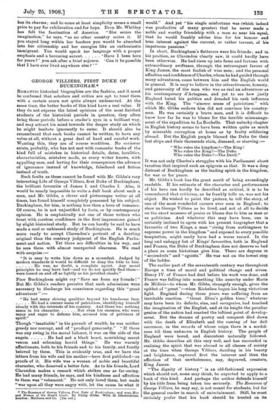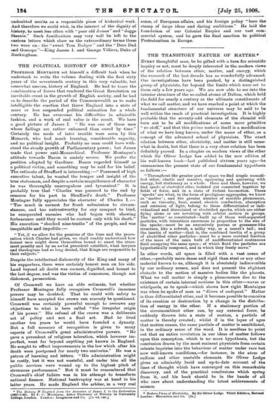GEORGE VILLIERS, FIRST DUKE OF BUCKINGHAM.*
ROMANTIC historical biographies are the fashion, and it must be confessed that scholars and critics are apt to treat them
with a certain scorn not quite always undeserved. At the same time, the better books of this kind have a real value. If they do not express the latest opinions of the most finished students of the historical periods in question, they often bring those periods before a reader's eyes in a brilliant way, and may attract his mind towards the deeper study on which he might hesitate ignorantly to enter. It should also be remembered that such books cannot be written, to have any value at all, without a great deal of hard and careful work. Wanting this, they are of course worthless. No reviewer exists, probably, who has not met with romantic books of the kind full of mistakes in historical details, dates, localities, characteristics, mistakes made, as every writer knows, with appalling ease, and having for their consequence the advance of ignorance instead of knowledge, falsehood and fiction instead of truth.
Such faults as these cannot be found with Mr. Gibbs's very interesting Life of George Villiers, first Duke of Buckingham, the brilliant favourite of James I. and Charles I. Also, it would be nearly impossible to write a dull book about such a man, and Mr. Gibbs, a clever and picturesque writer at all times, has found himself completely possessed by his subject. Buckingham, for him, is nothing less than a hero of romance.
Of course, he is not unjustified by facts, or by contemporary opinion. He is emphatically not one of those writers who trust with careless confidence in the first impressions gained by slight historical study. But he can hardly be said to have made a cool or unbiassed study of Buckingham. He is much more ready to accept Clarendon's portrait of a dazzling original than the contrary judgment of the English Parlia- ment and nation. Yet there are difficulties in his way, and he sees them with almost unexpected clearness. We read with surprise :—
"It is easy to write him down as a scoundrel. Judged by modern standards it would be difficult to deny the title to him.
He was, no doubt, a complete egoist. Any moral principles he may have had—and we do not quickly find them— were tossed on and off as lightly as his jewelled cloaks."
Poor Buckingham might cry "Save me from ray friends !" But Mr. Gibbs's readers perceive that such admissions were necessary to discharge his conscience regarding this "great adventurer"
"He had many shining qualities beyond his handsome face. He had a sincere sense of patriotism, identifying himself closely with the interests of his country. And there was nothing
mean in his character Not even his enemies, who were many and eager to defame him, accused him of pettiness of spirit."
Though "insatiable" in his pursuit of wealth, he was neither greedy nor corrupt, and of "prodigal generosity." "If there was any swing in the moral balance, it was on the side of the
angels He had not a black heart, nourishing secret venom and scheming horrid things." He was warmly affectionate, both to his friends and to his family, and fondly beloved by them. This is evidently true, and we have the letters from his wife and his mother—here first published—as proofs of it. His wife was a woman of noble and beautiful character, who deserved a better fate. As to his friends, Lord Clarendon makes a remark which strikes one as far-seeing.
He had many friends, he says, and his kindness and affection to them was "vehement." He not only loved them, but made "war upon all they were angry with, let the cause be what it
.* Th. Romance of George Fatten, First Duke of Buckingham; and some Men and Women of the Stuart Court. By Philip Gibbs. With 20 Illustrations. London: Methuen and Co. [15a. not.]
would." And yet "his single misfortune was (which indeed was productive of many greater) that he never made a noble and worthy friendship with a man so near hie equal, that he would frankly advise him for his honour and true interest against the current, or rather torrent, of his impetuous passions."
In short, Buckingham's flatterers were his friends ; and in his position, as Clarendon clearly saw, it could hardly have been otherwise. He had risen up into fame and fortune with extraordinary swiftness, through the extravagant favour of King James, the most foolish of wise men ; and the personal affection and confidence of Charles, whom he had guided through many adventures, came between him and the English world in general. It is easy to believe in the attractiveness, honesty, and generosity of the man who was as real an adventurer as his contemporary d'Artagnan, and yet to see how justly England hated his politics and dreaded his rash influence with the King. The "sincere sense of patriotism" with which Mr. Gibbs endows him did not convince his country- men. He was certainly a brave man, and it is difficult to know bow far he was to blame for the terrible mismanage- ment of the expedition to La Rochelle. That unlucky chapter in English history seems to have been written quite as much by miserable corruption at home as by faulty soldiering abroad. But the English people blamed the Duke for their lost ships and their thousands slain, diseased, or starving :—
" Who rules the kingdom?—The King Who rules the King F—The Duke. Who rules the Duke ?—The Devil."
It was not only Charles's struggles with his Parliament about taxation that inspired such an epigram as that. It was a deep distrust of Buckingham as the leading spirit in the kingdom, for war or for peace.
Mr. Gibbs's book has the great merit of being exceedingly readable. If his estimate of the character and performances of his hero can hardly be described as critical, it is to be remembered that criticism, as be frankly tells us, was not his object. He wished to paint the picture, to tell the story, of one of the most wonderful careers ever seen in England ; to show us George Villiers as he lived, and not at all to decide on the exact measure of praise or blame due to him as man or as politician. And whatever this may have been, one is certainly inclined to agree with his present biographer that a favourite of two Kings, a man "rising from nothingness to supreme power in the kingdom "and exposed to every possible temptation, might easily have had a worse record. In the long and unhappy list of Kings' favourites, both in England and France, the Duke of Buckingham does not deserve so bad a place as some historians give him. There are degrees in " scoundrels " and "egoists." He was not on the lowest step of the ladder.
The earlier part of the seventeenth century was throughout Europe a time of moral and political change and stress. Henry IV. of France had died before his work was done, and France was falling into something like anarchy under Marie de Medicis—to whom Mr. Gibbs, strangely enough, gives the epithet of " great"—when Richelieu began his long victorious fight. England during these years was suffering from an inevitable reaction. "Great Eliza's golden time," whatever may have been its defects, sine, and savageries, had touched the imagination of the English, and at it height the peculiar genius of the nation had reached the loftiest point of develop- ment. But the dreams of poetry and conquest died down with the death of Elizabeth and the coming of her dull successor, in the records of whose reign there is a sordid- ness till then unknown in English history. The people of England were bored, and discontent naturally followed. Mr. Gibbs describes all this very well, and has succeeded in realising the spirit that was abroad in all classes of society at the time when George Villiers, dazzling in his beauty and brightness, captured first the interest and then the affection of that unwholesome, nay, depraved, creature, King James.
"The dignity of history" is an old-fashioned expression which should not, some may think, be expected to apply to a book of this kind. And perhaps the author defends himself by his title from being taken too seriously. The Romance of George Villiers, he may say, is not meant for students, but for the general reader in search of entertainment. Still, he must certainly prefer that his book should be treated on its undoubted merits as a responsible piece of historical work. And therefore we could wish, in the interest of the dignity of history, to meet less often with "poor old James" and " dogge Steonie." Such familiarities may very well be left to the curious letters which show us the extraordinary terms these two were on : the "sweet Tom Badger" and the " Dere Dad and Gossope "—King James I. and George Villiers, Duke of Buekitgbani.







































 Previous page
Previous page